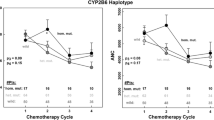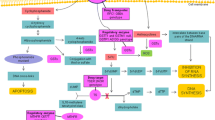Abstract
Background
Breast cancer patients regularly undergo adjuvant chemotherapies following surgery. However, these treatments are largely associated with chemotherapeutic toxicities ranging from nausea to severe myelosuppression. In this investigation, we examined the effects of four SNPs in NR1I2, CYP3A4 and CYP3A5 genes on chemotherapy-induced severe neutropenia in 311 female Chinese breast cancer patients undergoing a standard adjuvant chemotherapy regimen.
Methods
Patients were monitored for adverse reactions throughout the treatment, then divided into “none or mild” (80 %) or “severe” (20 %) toxicity groups according to whether they suffered grade 4 neutropenia defined as having an absolute neutrophil counts (ANC) of less than 0.5 × 109/L anytime during the treatment. DNA was extracted from patients’ peripheral blood samples, then genotyped using allele-specific Tm-shift PCR and melting analysis.
Results
Logistic regression revealed that rs776746 or CYP3A5*3 strongly associated with grade 4 neutropenia (OR = 2.56, P = 0.023) after adjustment for covariates, one of which more significant factor was baseline ANC (OR = 0.68, P = 0.020). Although univariate analysis in all patients did not reveal any association at first, further analysis indicated that rs776746 is significantly associated with severe neutropenia in subgroup of breast cancer patients with normal baseline ANC (≥2.0 × 109/L). These carriers of A-allele have 3.14-fold increased risk of developing severe neutropenia (P = 0.004).
Conclusion
Our results suggested that polymorphisms in CYP3A5 might be useful pharmacogenetic markers for the prediction of severe neutropenia during chemotherapy, however, only after screening patients by their baseline ANC in the presence of gene–environmental interaction. We demonstrate an approach of pharmacogenetic analysis, in which the genetic data should be analyzed in the perspective of other clinical parameters.
Similar content being viewed by others
References
Anglicheau D, Legendre C, Beaune P, Thervet E (2007) Cytochrome P450 3A polymorphisms and immunosuppressive drugs: an update. Pharmacogenomics 8(7):835–849
Barrett JC, Fry B, Maller J, Daly MJ (2005) Haploview: analysis and visualization of LD and haplotype maps. Bioinformatics 21(2):263–265. doi:10.1093/bioinformatics/bth457
Beith J, Goh B, Yeo W, Sullivan A, Lim S, Zhong S, Rivory L (2002) Interethnic differences in the myelotoxicity of adriamycin/cyclophosphamide (AC) for adjuvant breast cancer. In: Proceedings of American Society of Clinical Oncology Annual Meeting: J Clin Oncol 21:64a, #252
Bray J, Sludden J, Griffin MJ, Cole M, Verrill M, Jamieson D, Boddy AV (2010) Influence of pharmacogenetics on response and toxicity in breast cancer patients treated with doxorubicin and cyclophosphamide. Br J Cancer 102(6):1003–1009
Chew HK, Doroshow JH, Frankel P et al (2009) Phase II studies of gemcitabine and cisplatin in heavily and minimally pretreated metastatic breast cancer. J Clin Oncol 27(13):2163–2169
Du J, Xing Q, Xu L et al (2006) Systematic screening for polymorphisms in the CYP3A4 gene in the Chinese population. Pharmacogenomics 7(6):831–841
Fleeman N, Martin Saborido C, Payne K et al (2011) The clinical effectiveness and cost-effectiveness of genotyping for CYP2D6 for the management of women with breast cancer treated with tamoxifen: a systematic review. Health Technol Assess 15(33):1–102
Grann VR, Bowman N, Joseph C et al (2008) Neutropenia in 6 ethnic groups from the Caribbean and the U.S. Cancer 113(4):854–860
Han HS, Reis IM, Zhao W et al (2011) Racial differences in acute toxicities of neoadjuvant or adjuvant chemotherapy in patients with early-stage breast cancer. Eur J Cancer 47(17):2537–2545
Hor SY, Lee SC, Wong CI et al (2008) PXR, CAR and HNF4alpha genotypes and their association with pharmacokinetics and pharmacodynamics of docetaxel and doxorubicin in Asian patients. Pharmacogenomics J 8(2):139–146
Hu YF, He J, Chen GL et al (2005) CYP3A5*3 and CYP3A4*18 single nucleotide polymorphisms in a Chinese population. Clin Chim Acta 353(1–2):187–192
Ihunnah CA, Jiang M, Xie W (2011) Nuclear receptor PXR, transcriptional circuits and metabolic relevance. Biochim Biophys Acta 1812(8):956–963
Jiang J, Tang NL, Ohlsson C et al (2009) Association of genetic variations in aromatase gene with serum estrogen and estrogen/testosterone ratio in Chinese elderly men. Clin Chim Acta 411(1–2):53–58
Jiang J, Tang NL, Ohlsson C et al (2010) Association of SRD5A2 variants and serum androstane-3alpha,17beta-diol glucuronide concentration in Chinese elderly men. Clin Chem 56(11):1742–1749
Kim K-P, Ahn J-H, Kim S-B, Jung KH, Yoon DH, Lee JS, Ahn S-H (2012) Prospective evaluation of the drug-metabolizing enzyme polymorphisms and toxicity profile of docetaxel in Korean patients with operable lymph node-positive breast cancer receiving adjuvant chemotherapy. Cancer Chemother Pharmacol 69(5):1221–1227. doi:10.1007/s00280-011-1816-4
King BP, Leathart JB, Mutch E, Williams FM, Daly AK (2003) CYP3A5 phenotype-genotype correlations in a British population. Br J Clin Pharmacol 55(6):625–629
Kuehl P, Zhang J, Lin Y et al (2001) Sequence diversity in CYP3A promoters and characterization of the genetic basis of polymorphic CYP3A5 expression. Nat Genet 27(4):383–391
Law C-C, Fu Y-T, Chau K-K, Choy T-S, So P-F, Wong K-H (2007) Toxicity profile and efficacy of oral capecitabine as adjuvant chemotherapy for Chinese patients with Stage III colon cancer. Dis Colon Rectum 50(12):2180–2187
Ling WHY, Lee SC (2011) Inter-ethnic differences—how important is it in cancer treatment? Ann Acad Med Singap 40(8):356–361
Low SK, Kiyotani K, Mushiroda T, Daigo Y, Nakamura Y, Zembutsu H (2009) Association study of genetic polymorphism in ABCC4 with cyclophosphamide-induced adverse drug reactions in breast cancer patients. J Hum Genet 54(10):564–571
Ma B, Yeo W, Hui P, Ho WM, Johnson PJ (2002) Acute toxicity of adjuvant doxorubicin and cyclophosphamide for early breast cancer—a retrospective review of Chinese patients and comparison with an historic Western series. Radiother Oncol 62(2):185–189
Ma BBY, Hui EP, Mok TSK (2010) Population-based differences in treatment outcome following anticancer drug therapies. Lancet Oncol 11(1):75–84
Nakajima M, Komagata S, Fujiki Y et al (2007) Genetic polymorphisms of CYP2B6 affect the pharmacokinetics/pharmacodynamics of cyclophosphamide in Japanese cancer patients. Pharmacogenet Genomics 17(6):431–445
Phan VH, Moore MM, McLachlan AJ, Piquette-Miller M, Xu H, Clarke SJ (2009) Ethnic differences in drug metabolism and toxicity from chemotherapy. Expert Opin Drug Metab Toxicol 5(3):243–257
Phan VH, Tan C, Rittau A, Xu H, McLachlan AJ, Clarke SJ (2011) An update on ethnic differences in drug metabolism and toxicity from anti-cancer drugs. Expert Opin Drug Metab Toxicol 7(11):1395–1410
Regan MM, Leyland-Jones B, Bouzyk M et al (2012) CYP2D6 genotype and tamoxifen response in postmenopausal women with endocrine-responsive breast cancer: the breast international group 1–98 trial. J Natl Cancer Inst 104(6):441–451
Rizzo R, Spaggiari F, Indelli M, Lelli G, Baricordi OR, Rimessi P, Ferlini A (2010) Association of CYP1B1 with hypersensitivity induced by taxane therapy in breast cancer patients. Breast Cancer Res Treat 124(2):593–598
Sandanaraj E, Lal S, Selvarajan V et al (2008) PXR pharmacogenetics: association of haplotypes with hepatic CYP3A4 and ABCB1 messenger RNA expression and doxorubicin clearance in Asian breast cancer patients. Clin Cancer Res 14(21):7116–7126
Shih PS, Huang JD (2002) Pharmacokinetics of midazolam and 1′-hydroxymidazolam in Chinese with different CYP3A5 genotypes. Drug Metab Dispos 30(12):1491–1496
Sohn KJ, Croxford R, Yates Z, Lucock M, Kim YI (2004) Effect of the methylenetetrahydrofolate reductase C677T polymorphism on chemosensitivity of colon and breast cancer cells to 5-fluorouracil and methotrexate. J Natl Cancer Inst 96(2):134–144
Tirona RG (2010) Impact of nuclear receptors CAR, PXR, FXR, and VDR, and their ligands on enzymes and transporters. In: Pang KS, Rodrigues AD, Peter RM (eds) Enzyme- and transporter-based drug–drug interactions, progress and future challenges, 1st edn. Springer, New York, pp 75–105. doi:10.1007/978-1-4419-0840-7_4
Tsai SM, Lin CY, Wu SH, Hou LA, Ma H, Tsai LY, Hou MF (2009) Side effects after docetaxel treatment in Taiwanese breast cancer patients with CYP3A4, CYP3A5, and ABCB1 gene polymorphisms. Clin Chim Acta 404(2):160–165
Wang J, Chuang K, Ahluwalia M et al (2005) High-throughput SNP genotyping by single-tube PCR with Tm-shift primers. Biotechniques 39(6):885–893
Wong ALA, Yap HL, Yeo WL et al (2011) Gemcitabine and platinum pathway pharmacogenetics in Asian breast cancer patients. Cancer Genomics Proteomics 8(5):255–259
Yao S, Barlow WE, Albain KS et al (2010a) Gene polymorphisms in cyclophosphamide metabolism pathway, treatment-related toxicity, and disease-free survival in SWOG 8897 clinical trial for breast cancer. Clin Cancer Res 16(24):6169–6176
Yao S, Barlow WE, Albain KS et al (2010b) Manganese superoxide dismutase polymorphism, treatment-related toxicity and disease-free survival in SWOG 8897 clinical trial for breast cancer. Breast Cancer Res Treat 124(2):433–439
Yau T, Ng T, Soong I et al (2009) Toxicity of docetaxel plus cyclophosphamide as adjuvant therapy for breast cancer in Chinese patients—the Hong Kong experience. Asia Pac J Clin Oncol 5(2):123–128
Zhou Q, Yu X, Shu C et al (2011) Analysis of CYP3A4 genetic polymorphisms in Han Chinese. J Hum Genet 56(6):415–422
Acknowledgments
This investigation was supported by GlaxoSmithKline Oncology International Ethnic Research Initiative (GSK-ERI) funding (Co-PI: Nelson LS Tang and Winnie Yeo).
Ethical Standards
The study was approved by the Clinical Research Ethics Committee of the Chinese University of Hong Kong.
Conflict of interest
None.
Author information
Authors and Affiliations
Corresponding author
Electronic supplementary material
Below is the link to the electronic supplementary material.
Rights and permissions
About this article
Cite this article
Tang, N.L.S., Liao, C.D., Wang, X. et al. Role of pharmacogenetics on adjuvant chemotherapy-induced neutropenia in Chinese breast cancer patients. J Cancer Res Clin Oncol 139, 419–427 (2013). https://doi.org/10.1007/s00432-012-1345-5
Received:
Accepted:
Published:
Issue Date:
DOI: https://doi.org/10.1007/s00432-012-1345-5




